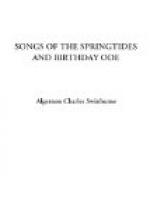Feb. 25, 1880.
297. Les Contemplations, 1856.
321. La Legende des Siecles.
Premiere serie, 1859; nouvelle
serie, 1877.
392. Les Miserables, 1862.
409. Les Travailleurs de la Mer, 1866.
417. L’Homme qui Rit, 1869.
433. Quatre-vingt-treize, 1874.
441. William Shakespeare, 1864.
448. Actes et Paroles; Avant
l’Exil, 1841-1851; Pendant
l’Exil, 1852-1870; Depuis l’Exil,
1870-1876.
452. Paris, 1867.
455. Mes Fils, 1875.
456. Pour un Soldat, 1875.
457. Les Chansons des Rues et des Bois, 1865.
462. L’Annee Terrible, 1872.
464. L’Art d’etre Grandpere, 1877.
470. Le Pape, 1878.
497. “Septidi ventose
an X de la Republique (26 fevrier 1802).”
Victor Hugo raconte par un temoin de sa
vie, 1863,
tome 1, p. 28.
At the end of such a list, so incomparable as to seem incredible, of one great man’s good works, we may be forgiven the alteration of a word even in a verse from AEschylus which we cannot choose but apply once more to this leader in the advance of men made perfect through doom of trial and long wayfaring, whose progress he furthers by example and stimulates by song:—
[Greek: kurios esti throein
hodion kratos aision andron
ekteleon; eti gar theothen katapneiei
peitho molpan
alkai sumphutos aion.]
AEsch. Agam. 104-8.



